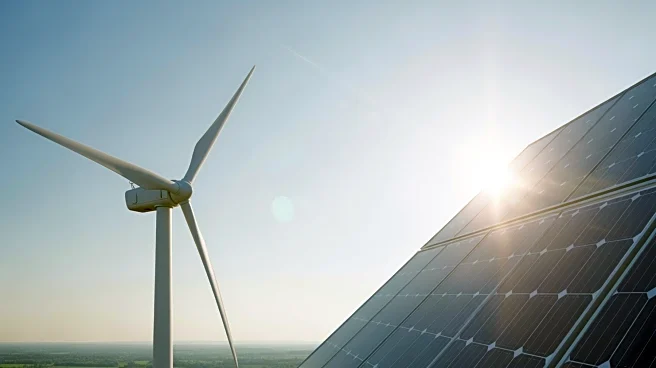What's Happening?
The International Renewable Energy Agency (IRENA) and the Climate Policy Initiative (CPI) have released a report indicating that global investments in renewable energy have reached $807 billion in 2024.
This figure represents approximately one-third of the total $2.4 trillion invested in energy transitions last year. Despite the substantial investment, the growth rate of clean power has slowed, with annual investments increasing by only 7.3% in 2024 compared to 32% the previous year. The report highlights that funding for renewables is heavily concentrated in advanced economies, while emerging and developing countries require more financial support to ensure a global transition. Investments in manufacturing facilities for solar, wind, battery, and hydrogen technologies have seen a decline, particularly in solar PV manufacturing, while battery factory investments have nearly doubled, driven by rising demand for storage solutions.
Why It's Important?
The report underscores the critical need for scaling financial support to emerging and developing countries to make the energy transition inclusive and global. The concentration of investments in advanced economies could lead to disparities in energy security and socio-economic benefits. The slowdown in clean power growth suggests challenges in maintaining momentum in renewable energy expansion. The increase in battery factory investments reflects a growing demand for energy storage solutions, which are essential for integrating renewable energy into grids and supporting electric vehicles and data centers. The report calls for international cooperation to address these disparities and ensure a balanced global energy transition.
What's Next?
As countries convene at COP30 to advance the 'Baku to Belém Roadmap to 1.3 trillion,' there is a focus on scaling finance for emerging and developing countries. This initiative aims to make the energy transition truly inclusive and global. The report suggests that new factories are emerging outside advanced economies and China, which could expand energy security and socio-economic benefits to other developing economies. The international community may need to explore innovative financing mechanisms and partnerships to support these efforts and address the challenges highlighted in the report.
Beyond the Headlines
The report highlights the ethical and socio-economic dimensions of the energy transition, emphasizing the need for equitable access to renewable energy resources. The concentration of investments in advanced economies raises questions about global equity and the ability of developing countries to participate in the transition. The emergence of new factories outside traditional centers of investment could signal a shift towards more distributed and inclusive energy production, potentially reducing dependency on a few dominant players and fostering local economic development.









